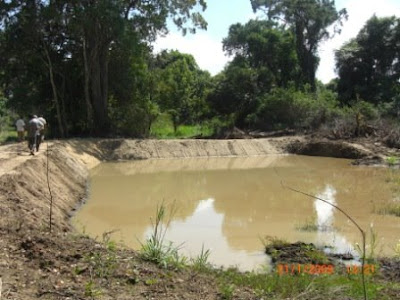
I went to a village this week, in the Moneragala District, Kotiyagala is its name. The village consists of approximately 450 families or households. The road ends at the village and from there it is forest and scrub-land that borders the Yala National Park. The distance to the village from Colombo exceeds 270 km, and the last stretch from the main road, Monaragala to Siyambalanduwa is about 25km on a rough, badly maintained gravel and tar road.
There have been unsolved killings just outside the village, in the forest as late as last week, attributed to the LTTE, but not proven. There is a police and home guard presence that has now prevented the villages going into the forests on the grounds of the area still not being safe.
Some of the villagers are used to the slash and burn method of chena cultivation, which grows a crop with the resulting seasonal rains. They set fire to a forest area and clear it and then sow some seed, be it mustard, or kurakkan or even maize. The rains when they come will germinate the seeds and help them grow and depending on the frequency of rain some farmers have been able to earn a good living. This year however, they were prevented from going to the forest by the security forces, and those who stayed behind to till and sow paddy lost their crop to the little rain that has fallen this year which has followed the wet year in 2008.
It must be stated that the population of the area engages in illegal activity, which include, felling trees for timber, brewing moonshine, hunting, and growing marijuana. The prevailing security situation prevented them from engaging in this activity, and accordingly, they are in an angry mood with little means of livelihood.
It is in this context that a company I am advising has decided to come to the village to set up a project, which is expected to be mutually beneficial, both for the investors in the company, and for the locals. When a project, in this case a BOI project, with foreign investment, is made, it is with profit in mind, but the government considers its contribution to the host community which is expected to benefit, from employment and income. As a distraction the private investor hopes to also get NGO assistance for the locals to help build their lives, like assisting with the construction of their homes and livelihood. The village therefore will be the main beneficiary.
The company has entered into an agreement with the farmers to assist them in the preparation of the land they have been given. They loaned funds on infrastructure upgrade. The proviso is that the farmers benefiting from the project will then be charged by way of a deduction, from the produce the company has agreed to purchase.
The company to date, over a 4 month period, spent Rs10M on infrastructural development, by fencing the land, renovating or building new tanks, constructing new roads, and tilling the soil. They have also galvanized the local community and have obtained the assistance of the Agricultural department to run workshops, to explain what and how much of certain crops they require each farmer to commit to plant. It is under this background, that I went as part of a team to assess the current level of progress in planting the required crops.
Much to our consternation, there were hardly any plants that have been planted. A numerous set of reasons, with the drought conditions being the primary cause, was blamed for most for this inaction. I am inclined to believe that if I had been given the funds already spent, I could have arrived at a respectable level of planting using paid labor.
The farmers gave up too easily when the rains failed instead of taking alternative measures to grow at least the main crop, namely traditional papaya. This is because of one of two reasons. Either the farmers were waiting for the company to provide all the infrastructure before they get onto the land, or they genuinely were misled by officers tasked with advising them, which led to a severe delay in the commencement of their tasks.
This expectation is viewed as a right, and not a privilege, and so the missing of the planting season, was not viewed as critical. It was indeed critical to make sure all the infrastructure was in place before a seed was planted!!
This is what is wrong with people. They always put their interests first and in this case, the company’s primary interest in coming to this village, namely of getting produce in the form of papaya fruit seems to be conveniently forgotten. This belief in the right to something free without having to pay is endemic to Sri Lanka and so debilitating for those relying on the locals. If we cannot change this psyche there is just no chance to succeed. The company has had to place mind over matter, and coax the locals to perform with no more help. Only then can they obtain what they want and not before.

No comments:
Post a Comment